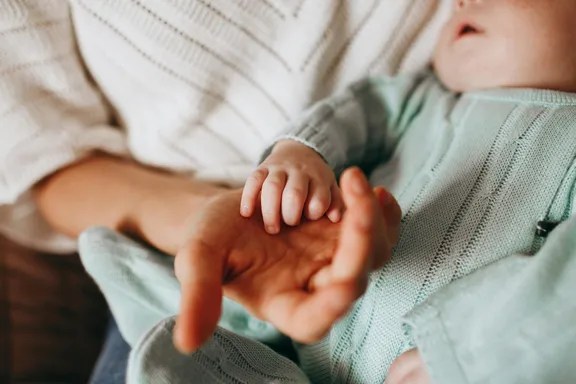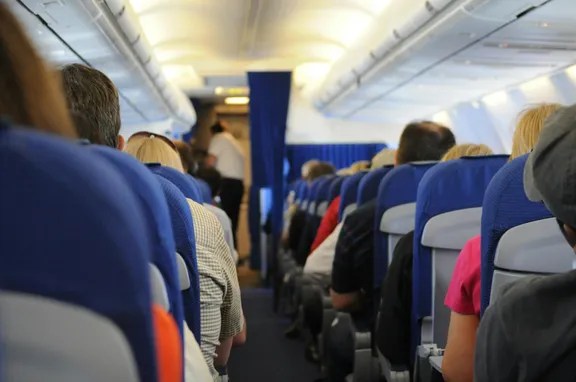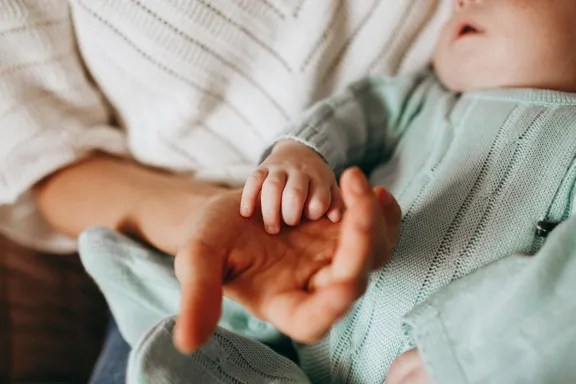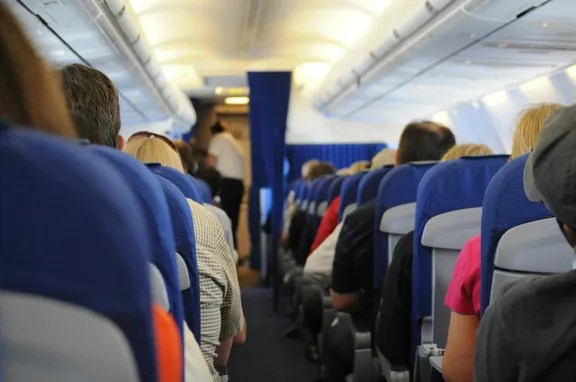When a man told me to leave my airplane seat because my granddaughter wouldn’t stop crying, I packed up my things with tears in my eyes. But then, a teenage boy offered me his seat in business class. What happened after that made the rude man turn pale.
I’m 65 years old, and this past year has been filled with sadness, sleepless nights, and worry. My daughter died shortly after giving birth. She fought hard during delivery, but her body couldn’t survive.
In just a few hours, I went from being a mother of a grown daughter to the only caregiver of a newborn baby. Things got even harder after that. My son-in-law, the baby’s father, couldn’t handle it. I saw him hold his daughter once in the hospital. He looked at her tiny face, whispered something, and gently put her back in the crib, his hands shaking.
The next morning, he was gone. He didn’t take the baby home or help with the funeral. Instead, he left a note saying he wasn’t ready for this life and that I would know what to do. That was the last time I saw him.
So, my granddaughter was placed in my arms. She became my responsibility — the only parent she had. I named her Lily.

The first time I said my granddaughter’s name out loud after my daughter’s funeral, I broke down in tears. My daughter had chosen the name “Lily” when she was seven months pregnant, saying it was simple, sweet, and strong — just like she hoped her little girl would be. Now, every time I whisper “Lily” while rocking her to sleep at 3 a.m., it feels like I’m bringing my daughter’s voice back into the world.
Taking care of Lily hasn’t been easy. Babies cost more than I remembered, and money disappears quickly. I stretch my pension as much as I can and take small jobs — babysitting neighbors’ kids or helping at the church food pantry in exchange for groceries. Most days, it feels like I’m barely staying afloat.
Some nights, after I put Lily in her crib, I sit alone at the kitchen table staring at bills, wondering how I’ll survive another month. But then she makes soft little sounds and looks up at me with her big curious eyes. In those moments, I remember why I keep going. She lost her mom before she could know her. Her dad left before she was even a week old. She deserves someone who will never leave her.
When my best friend Carol called from across the country and begged me to visit for a week, I wasn’t sure. “Margaret, you need a break,” she said. “Bring Lily. I’ll help you. We can take turns at night so you can rest.” The idea of rest felt impossible, but Carol was right — I was exhausted and worn out.
I saved up just enough for a budget flight. It wasn’t fancy and the seats were small, but it would get us there. That’s how I ended up on a crowded plane with Lily in my arms and a heavy diaper bag on my shoulder, hoping for a few quiet hours in the air.

As soon as we sat down in our cramped seats near the back of the plane, Lily started fussing. At first, it was a small whimper, but within minutes it turned into loud crying. I tried everything — rocking her gently, whispering, “Shh, it’s okay, Grandma’s here.” I offered her a bottle I’d prepared, but she refused it. I even checked her diaper as best I could in the tight space, but nothing worked.
Her crying got louder, echoing through the plane. My cheeks burned with embarrassment as people turned to look. The woman in front sighed and shook her head, and a man two rows ahead glared at me like I was ruining his flight on purpose. My hands shook as I bounced Lily, humming a lullaby my daughter used to love, hoping it would calm her — but it didn’t. The air felt heavy with judgment. Every cry made me want to disappear. I held Lily close, kissed her head, and whispered, “Please stop crying, baby. We’ll be okay. Just calm down for Grandma.” But she kept crying.
Then the man sitting next to me lost his patience. He had been groaning and shifting in his seat for a while. Finally, he rubbed his temples and snapped, “For God’s sake, can you shut that baby up?” loud enough for everyone nearby to hear. I froze, speechless.
“I paid good money for this seat,” he said. “Do you really expect me to sit next to a screaming baby the whole flight? If you can’t quiet her, then move — stand with the flight attendants or lock yourself in the bathroom. Anywhere but here.”
Tears filled my eyes as I held Lily tighter, still rocking her while she cried. “I’m trying,” I whispered shakily. “She’s just a baby. I’m doing my best.”

“Well, your best isn’t good enough,” the man snapped. “We shouldn’t have to suffer because you can’t control her. Get up. Now.”
My face burned with shame. I didn’t argue — I just stood up, holding Lily and the diaper bag. My legs felt weak, but I knew I couldn’t stay next to him. “I’m so sorry,” I whispered as I turned toward the aisle, ready to move to the back of the plane. My eyes were full of tears, and I felt humiliated and defeated.
But then, a voice stopped me. “Ma’am?” I turned and saw a boy, about 16, standing a few rows ahead.
“Please wait,” he said gently. “You don’t have to go to the back.” And as if she understood, Lily’s crying suddenly slowed and then stopped. The silence was shocking after nearly an hour of nonstop crying. The boy gave a small smile. “See? She’s just tired. She needs a calmer place,” he said, handing me a boarding pass. “I’m sitting in business class with my parents. Please take my seat — you’ll both be more comfortable.”
I stared at him in surprise. “Oh no, I can’t take your seat. You should stay with your family.” But he shook his head. “No, really. My parents will understand. They want me to do this.”
His kindness moved me. I nodded, holding Lily close. “Thank you. You don’t know how much this means.” He stepped aside, letting me pass. I walked forward on shaky legs, still in shock.
When I reached business class, the boy’s parents stood to greet me. His mother gently touched my arm. “You’re safe here. Please, sit and relax.” His father nodded and asked a flight attendant to bring extra pillows and blankets.
I sank into the wide, soft seat, amazed by the difference. The air felt calm and quiet. I laid Lily across my lap, and she sighed before closing her eyes. For the first time on the flight, she was peaceful. I warmed her bottle and fed her, and she drank quietly. Tears rolled down my cheeks — but this time, they were tears of relief and gratitude. All because a teenage boy cared when no one else did.
“See, baby girl?” I whispered to Lily. “There are still good people in the world. Remember that.”
But the story wasn’t over.
While I rested in business class, the boy went back to economy and sat in my old seat — right next to the man who had told me to leave. At first, the man looked happy. “Finally, that crying baby is gone. Now I can have peace.” But when he saw who was next to him, his smile disappeared. His hands began to shake. The boy was his boss’s son.
“Oh, hey,” the man stammered. “I didn’t know you were on this flight.”
The boy tilted his head slightly. “I heard everything you said about the baby and her grandmother. I saw how you treated them.”
The man’s face turned pale. “My parents taught me that how you treat people when you think no one important is watching shows who you really are,” the boy said calmly. “And what I saw tells me everything I need to know about you.”
The man tried to laugh it off, but his voice shook. “The baby was crying for an hour. Anyone would have—”
“Anyone kind would have helped,” the boy cut him off. “Anyone decent would have shown compassion, not cruelty.”
The rest of the flight was miserable for the man. He sat silently, clearly afraid of what might happen next.
When the plane landed, the boy told his parents everything. With each detail, his father’s expression grew darker. In the airport terminal, the boss confronted the man. I couldn’t hear their whole conversation, but I saw the man’s face fall. His shoulders drooped, and he looked like he wanted to disappear.
Later, the boy’s mother found me at baggage claim. She quietly told me that the man had been fired. His boss said anyone who treats strangers — especially a struggling grandmother and a crying baby — so cruelly has no place in his company. It reflected badly on the company and on him as a leader.
When I heard that, I didn’t feel happy or triumphant — just a sense of quiet justice. On that flight, both kindness and cruelty were shown clearly. A teenage boy chose compassion when it mattered most. A grown man chose anger and arrogance. In the end, it wasn’t my crying granddaughter who ruined his flight — it was his own behavior that ruined his future.
That flight changed me.
For a long time, I had felt invisible — just an old woman trying her best to raise a baby who had already lost too much. On that plane, humiliation almost broke me. But the kindness of one teenage boy and the support of his parents reminded me that there are still people who do the right thing when it matters.
Lily may never remember that day, but I always will. One act of cruelty made me feel small. But one act of kindness lifted me up and reminded me that I still matter.
When a man told me to leave my airplane seat because my granddaughter wouldn’t stop crying, I picked up my things with tears running down my face. But then, a teenage boy offered me his seat in business class — and what happened next made the rude man turn pale.
I’m 65 years old, and this past year has been full of sadness, sleepless nights, and constant worry. My daughter died shortly after giving birth. She fought hard during labor, but her body couldn’t survive.
In just a few hours, I went from being the mother of a grown daughter to the only person responsible for a newborn baby. Things got even harder when my son-in-law, the baby’s father, couldn’t handle it. I saw him hold his daughter once in the hospital. He looked at her tiny face, whispered something I couldn’t hear, then gently put her back in the crib, his hands shaking.
The next morning, he was gone. He didn’t take the baby home or stay to help with the funeral. Instead, he left a note saying he wasn’t ready for this life and that I would know what to do. That was the last time I saw him.
So my granddaughter was placed in my arms. She became my responsibility — the only parent she had. I named her Lily.
The first time I said her name out loud after my daughter’s funeral, I cried. My daughter had chosen the name when she was seven months pregnant, saying it was simple, sweet, and strong — just like she hoped her daughter would be. Now, every time I whisper “Lily” as I rock her to sleep at 3 a.m., it feels like I’m bringing my daughter’s voice back into the world.

Taking care of Lily has been very hard. Babies cost a lot more than I remembered, and every bit of money disappears quickly. I stretch my small pension as much as I can and do small jobs — like babysitting neighbors’ kids or helping at the church food pantry for groceries. Most days, it feels like I’m just barely getting by.
Some nights, after putting Lily to sleep, I sit alone at the kitchen table, staring at the bills and wondering how I’ll make it through another month. But then Lily makes soft baby noises and opens her big, curious eyes. In those moments, I remember why I keep going. She lost her mom before she could even know her. Her dad left before she was a week old. She deserves at least one person who will never leave her.
When my best friend Carol called from across the country and begged me to visit for a week, I wasn’t sure. “Margaret, you need a break,” she said. “Bring Lily with you. I’ll help. We’ll take turns feeding her at night. You can finally rest.” The idea of rest felt impossible, but she was right — I was exhausted, and I could feel it deep down.
I saved just enough money for a cheap plane ticket. It wasn’t comfortable and the seats were small, but it would get me there. That’s how I ended up on a crowded plane with a heavy diaper bag on my shoulder and Lily in my arms, hoping for a few peaceful hours in the air.

As soon as we sat down in our small seats near the back of the plane, Lily started fussing. At first, it was a quiet whimper, but within minutes it turned into loud crying. I tried everything — rocking her gently and whispering, “Shh, Lily, it’s okay, Grandma’s here.” I offered her a bottle I had prepared, but she refused it. I even checked her diaper as best as I could in the tiny space, but nothing worked.
Her cries got louder, filling the whole cabin. My cheeks grew hot as people started looking at me. The woman in front sighed and shook her head. A man two rows ahead turned and glared at me, as if I was ruining his flight on purpose. My hands shook as I bounced Lily and hummed a lullaby my daughter used to love, praying it would help — but it didn’t. The crying only got worse. I felt everyone judging me, and each cry made me wish I could disappear. I held Lily close, kissed her head, and whispered, “Please stop crying, baby. We’ll be okay. Calm down for Grandma.” But she just kept crying.
Then the man sitting next to me lost his patience. He had been groaning and moving in his seat for a while. Finally, he pressed his fingers to his temples and snapped, “For God’s sake, can you shut that baby up?” loud enough for everyone to hear. I froze, not knowing what to say.
“I paid good money for this seat,” he went on. “Do you really expect me to sit next to a screaming baby the whole flight? If you can’t quiet her, then move. Go stand with the flight attendants or lock yourself in the bathroom — anywhere but here.”
Tears filled my eyes as I held Lily tighter, rocking her while she cried. “I’m trying,” I said shakily. “She’s just a baby. I’m doing my best.”

“Well, your best isn’t good enough,” the man snapped. “We shouldn’t have to suffer because you can’t control her. Get up. Now.”
My face burned with embarrassment. I didn’t argue. I stood up, holding Lily and the diaper bag. My legs felt weak, but I knew I couldn’t stay next to him. “I’m so sorry,” I whispered as I turned toward the aisle, ready to move to the back of the plane. My eyes were full of tears, and I felt humiliated and defeated.
But then a voice stopped me. “Ma’am?” I turned and saw a boy, about 16, standing a few rows ahead.
“Please wait,” he said kindly. “You don’t have to go to the back.” And as if she understood him, Lily’s crying suddenly softened and then stopped. The silence was shocking after nearly an hour of nonstop crying. The boy smiled. “See? She’s just tired. She needs a calmer space,” he said, handing me his boarding pass. “I’m sitting in business class with my parents. Please take my seat — you’ll both be more comfortable.”
I was stunned. “Oh no, I can’t take your seat. You should stay with your family.” But he shook his head. “No, really. My parents will understand. They want me to do this.”
His kindness touched my heart. I nodded and held Lily tightly. “Thank you. You don’t know how much this means.” He stepped aside and let me pass. My legs were shaking as I walked forward, still in disbelief.
When I reached business class, the boy’s parents greeted me warmly. His mother gently touched my arm and said, “You’re safe here. Please sit and relax.” His father nodded and asked a flight attendant to bring extra pillows and blankets.
I sank into the wide, soft seat, amazed at how peaceful it felt. I laid Lily on my lap, and she sighed before closing her eyes. For the first time on the flight, she was calm. I warmed her bottle and fed her, and she drank quietly. Tears streamed down my face — but this time, they were from relief and gratitude. All because one teenage boy noticed me when no one else did.
“See, baby girl?” I whispered. “There are still good people in the world. Remember that.”
But the story didn’t end there.
While I rested in business class, the boy went back to economy and sat in my old seat — right next to the man who had told me to leave. At first, the man looked pleased. “Finally, that crying baby is gone. Now I can have peace.” But when he saw who was sitting beside him, his smile vanished. His hands started shaking — the boy was his boss’s son.
“Oh, hey,” the man stammered. “I didn’t know you were on this flight.”
The boy tilted his head slightly. “I heard everything you said about the baby and her grandmother. I saw how you treated them.”
The man’s face turned pale. “My parents taught me that how you treat people when you think no one important is watching shows who you really are,” the boy said calmly. “And what I saw tells me everything I need to know about you.”
The man tried to laugh it off, but his voice cracked. “The baby was crying for an hour. Anyone would have—”
“Anyone kind would have helped,” the boy interrupted. “Anyone decent would have shown compassion, not cruelty.”
The rest of the flight was miserable for the man. He sat silently, clearly worried about what might happen next.
When the plane landed, the boy told his parents everything. With each detail, his father’s expression grew darker. At the airport, the boss confronted the man. I couldn’t hear what was said, but I saw the man’s face fall. His shoulders drooped, and he looked like he wanted to disappear.
Later, the boy’s mother found me at baggage claim and quietly told me that the man had been fired. His boss said that anyone who could treat strangers — especially a struggling grandmother and a crying baby — with such cruelty had no place in his company. It reflected badly on the company and on him as a leader.
When I heard this, I didn’t feel happy or celebrate — I just felt a sense of quiet justice. On that flight, both kindness and cruelty were clearly shown. A teenage boy chose compassion when it mattered most, while a grown man chose anger and arrogance. In the end, it wasn’t my crying granddaughter who ruined his flight — it was his own behavior that ruined his future.
That flight changed me.
For a long time, I had felt invisible — just an old woman trying her best to raise a baby who had already lost too much. On that plane, humiliation almost broke me. But the kindness of one teenage boy and the support of his parents reminded me that there are still people who do the right thing when it counts.
Lily might never remember that day, but I always will. One act of cruelty made me feel small. But one act of kindness lifted me up and reminded me that I still matter.
